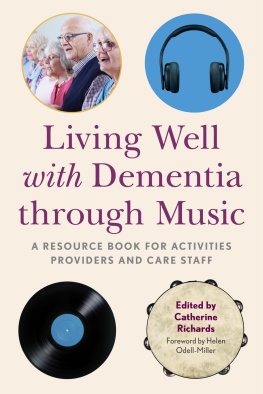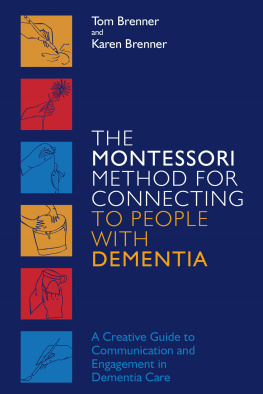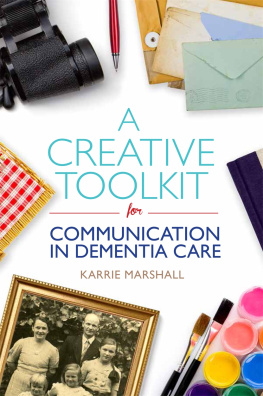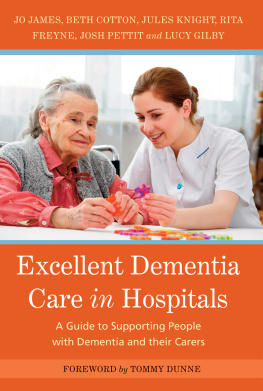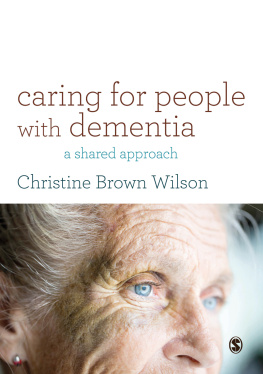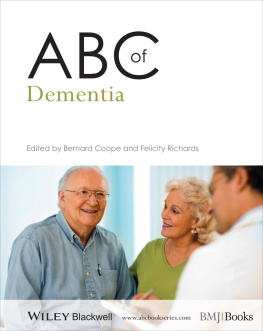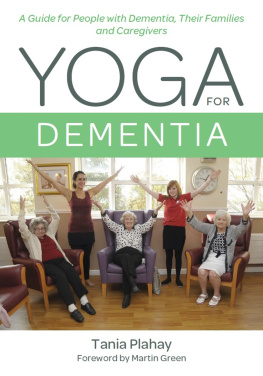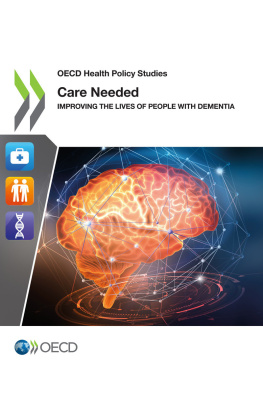Contents

LIVING WELL
with DEMENTIA
through MUSIC
A Resource Book for
Activities Providers and Care Staff
E DITED BY
CATHERINE RICHARDS
F OREWORD BY HELEN ODELL-MILLER

Contents
Foreword
Helen Odell-Miller
Imagine the only meaningful moment is now. For some people living with dementia, short-term memory is impaired so that understanding complex relations, linking the past to the present and following everyday conversation is difficult, sometimes impossible. Music therapy can provide individualised personal care through music, adapted in the moment for the persons needs and their family/carers, alongside other music interventions in groups and with individuals where professional musicians might work alongside trained music therapists. Music is also used more widely, and this is a truly collaborative book, which brings together the skills and experiences of music therapists with those of music practitioners, carers and other experts in the field of music and dementia. It includes all aspects of music, resources and people who can help people living with dementia, through music.
This unique book includes a how-to resource approach emphasising care approaches in the UK, and authors are writing from a UK perspective. It emphasises the substantial contribution that music can make for people living with dementia at different stages of their lives, and how different approaches are relevant in different circumstances. One of the salient messages in the book is that music can enable communication and relationship when words recede, and cognitive impairment prevents everyday easy communication. Compelling descriptions in each chapter reveal how music and all its rhythmic, melodic, harmonic and tonal qualities can help people with dementia, including their carers and families.
The book touches upon how many disciplines, including neuroscience, music therapy, musicology, medicine psychology, dementia theory and caregiver practice, can work together. Worldwide, around 50 million people have dementia, and this is estimated to increase to 75.6 million in 2030, and 135.5 million in 2050. Nearly 60 per cent are living in low- and middle-income countries. Every year, there are around 10 million new cases (WHO 2018). This results in an increased demand for long-term care in which effective management of symptoms is a major issue, and the need for communities to increase awareness and capacity to care for people at home in local settings. It is often difficult to distinguish between interventions delivered by a music therapist, and other musical interventions by professional or amateur musicians and carers. This book presents different approaches and touches upon research from across the fields, holding in mind at all times the notion that it is important to find out what is most effective for each population and setting. Receptive (listening) and active music-making are equally discussed.
At the time of writing this Foreword, I was involved in the aftermath of the music and dementia national commission about music for people with dementia, in the UK, to which some writers from this book contributed. The commission introduced a strategy for all people with dementia to have access to music. The report from the commission, funded by the Utley Foundation and organised by the International Centre for Longevity, called for more research, clarity on different musical interventions, better training for carers and musicians, and a system where all people living with dementia would have access to music when needed (Bowell and Bamford 2018). The report was launched in the House of Lords in the UK in January 2018, and four music therapists were included in the commission, along with other experts in the field. It is important that specialists are involved in policy-making and change, and this book provides evidence and information from world leaders in all the relevant fields, filling some gaps in knowledge that were identified by the commission. Following this, the Utley Foundation has launched Music for Dementia 2020, a campaign led by Grace Meadows, in order to realise the recommendations. This national movement is unique in the world at this level, involving all stakeholders, including the government, the BBC and policy-makers.
Music therapy-specific interventions for people with dementia typically include community groups for people with dementia and their carers, community music therapy groups with families, group music therapy in care homes and hospitals for people at different stages of dementia, and individual music therapy in the home. A variety of approaches, including improvisation, singing, song writing and listening to music, adapted to community, group or individual needs, are presented here. In addition, the book demonstrates that training carers to use music in their daily communication with people with dementia can improve quality of life, for those needing care and their carers, as well as reduce behavioural and psychological symptoms of dementia.
We know through research that music therapy helps procedural memory, emotion regulation, and social and relational communication with loved ones and carers. Music-making therefore contributes to those with psychosocial needs, and music can catch attention and memory, especially through song recollection. These processes can lead to flow and arousal and also to the reduction of Behavioural and Psychological Symptoms of Dementia (BPSD) such as agitation and anxiety. A recent review by Abraha et al. (2017) about which non-pharmacological interventions help people with BPSD in dementia care concluded that music therapy was one of just two forms of intervention for which there is convincing evidence of effectiveness in reducing BPSD. Activities providers and care staff are shown techniques, based on the expertise of the authors, for reducing BPSD through using music to engage and reclaim the identity of those they care for.
The unique significance and function of the qualities and potential for music in music therapy for people with dementia has previously been identified as important (Odell-Miller et al . 2017). This included non-verbal possibilities, use of all the senses, artistic spontaneity and musical narrative, and the physical, intellectual and emotional capacity of music. This important book explains why, drawing upon various approaches, studies and case material to substantiate what we know. It also demonstrates that single case studies, a narrative perspective and musical descriptions are all powerful evidence.
I will conclude by celebrating the fact that funding of over two million euros was announced in January 2019, for a new large multi-country study, HOMESIDE, led by University of Melbourne worldwide. At the Cambridge Institute for Music Therapy Research at Anglia Ruskin University, we are just about to launch the UK arm of this study, funded by Alzheimers Society UK, which will investigate music and reading interventions for couples living at home where one person is living with dementia. The award, through the EU Joint Programme for Neurodegenerative Diseases (JPND), demonstrates the commitment and recognition of the importance of music for people living with dementia and their carers. Through a randomised controlled trial 495 couples will be involved across five countries. We hope this, and all the work demonstrated in this book and more widely, will further ensure the sustainability and inclusivity of music for people with dementia. Congratulations to the editor and authors on this essential book. I recommend all those engaged with people living with dementia to read every chapter.

